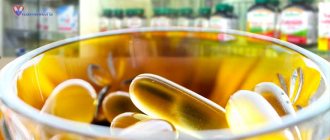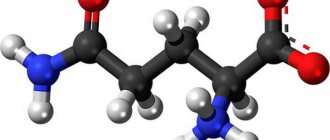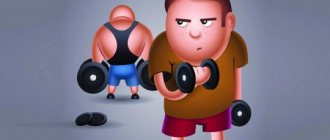Omega-3 fatty acids (fish oil) have an impressive list of health benefits for humans (men, women, and even children).
They help fight depression and irritation, improve memory and prevent the development of dementia, and are good for the health of the heart, kidneys, brain and eyes. And that's not all.
As a type of sports nutrition, omega-3s are actively promoted in sports, bodybuilding and fitness as supplements useful for accelerating recovery, increasing muscle strength and performance, strengthening the cardiovascular system, joints, increasing mental concentration and even for weight loss . And there are reasons for this.
Scientific research supports the benefits of omega-3 fatty acids for athletes. Of course, scientists do this a little less emotionally than sports nutrition manufacturers, but in general, omega-3s are really worthy of attention.
In this article we will talk about how omega-3s can be useful in sports and bodybuilding, how to take them correctly and what distinguishes sports omega-3s from those sold in pharmacies.
We recommend : What are Omega-3 fatty acids good for? Scientific facts.
Main thoughts:
Omega-3 fatty acids help with post-workout recovery in fitness and bodybuilding because... have an anti-inflammatory effect, accelerating the healing of muscle microtraumas
Omega-3 (fish oil) in bodybuilding has an unscientific anabolic effect, but may be useful in protecting muscles from catabolism
Omega-3 (fish oil) is effective in reducing muscle soreness after exercise
Omega-3 (fish oil) may improve muscle functionality by improving nerve-muscle communication
Omega-3s are beneficial for brain health: in sports and bodybuilding, consuming them improves mental focus and reaction time
Fish oil may be useful for improving body composition in fitness and bodybuilding (ratio of muscle mass to fat mass)
Fish oil improves calcium absorption, making bones healthier and reducing the risk of fractures
One of the important rules for taking omega-3 in fitness and bodybuilding: plant products and preparations based on them should never be the only source of omega-3
The recommended dosage of omega-3 in sports and bodybuilding varies widely between 500-2000 mg. To obtain this amount, it is enough to eat fatty fish at least twice a week or take omega-3 supplements
“Sports omega-3s” have no advantages over pharmaceutical ones
Beneficial properties and functions of polyunsaturated fatty acids
Omega-3 polyunsaturated fatty acids are a necessary nutrient for every body. The main function is to maintain and regulate metabolic processes occurring in the human body.
The compound is a complex of essential fatty acids found in foods. Practice shows that it is difficult to ensure the supply of a sufficient amount of this substance with food, so interest in Omega-3 supplements does not subside. Moreover, such capsules are used not only in sports, but also for the prevention and treatment of a number of diseases.
Main properties of the additive:
- anti-inflammatory effect;
- strengthening the immune system;
- normalization of metabolism;
- strengthening the walls of blood vessels;
- prevention of cardiovascular diseases;
- reducing the level of “bad” cholesterol;
- positive effect on the nervous system.
Omega-3 preparations are recommended for the prevention of heart and vascular diseases. They strengthen the walls of blood vessels, maintain their elasticity, and at the same time regulate cholesterol levels, preventing the development of atherosclerosis. This supplement takes part in metabolic processes occurring in the central nervous system, therefore it is recommended as part of a complex therapy for diseases associated with chronic stress and neurosis. It has been proven that consuming the daily dose of the substance helps cope with insomnia and reduces the risk of developing depression.
It is a mistake to believe that Omega-3 speeds up metabolism. In fact, a person’s basal metabolism is a constant value; it cannot be accelerated. The exception is cases of deterioration of metabolism due to diseases, such as obesity. Thus, Omega-3 helps restore metabolic rate and is therefore an important nutrient for weight loss.
Polyunsaturated fatty acids generally have a positive effect on the body, strengthening it and increasing resistance to negative external influences. A preventative course of taking dietary supplements is recommended for anyone who does not consume enough foods rich in this compound.
Fish oil for weight loss[edit | edit code]
Researchers from the French University of Inserm [3] found that eating 3 grams of fat daily reduced fat deposits on the sides of women. The experiment, which involved 30 French women with type 2 diabetes, was carried out over two months.
The French researchers' task was to determine the effectiveness of a moderate dosage of fish oil, namely 3 grams per day. The capsules taken by the experiment participants contained 1.8 g of omega-3 fatty acids, 1.1 g of EPA and 0.7 g of DHA.
The experiment involved 30 women, half of whom took a placebo. Participants in the fish oil group lost an average of 1 kg. Fat percentage decreased by 2%, especially in the torso area. Participants in the placebo group showed no changes in body weight.
Taking fish oil did not increase insulin sensitivity, but did reduce the risk of cardiovascular disease. Taking fish oil reduced blood levels of PAI-1 protein from 18.9 to 9.5 IE per milliliter. PAI-1 is the culprit in heart attacks. In the placebo group, PAI-1 protein increased from 16.9 to 19.2 IE per milliliter.
Fish oil supplementation also reduced the activity of inflammatory genes in women's fat cells.
Mechanism of fat burning action
In 2020, experts from Kyoto University (Japan) discovered that eating fish oil promotes the transition of “storage” white fat cells in the body into “burning” beige fat cells.[4]
There are several types of fat cells in the human body: white, beige and brown fat. They perform different functions: white cells store fat for energy supply, while brown cells burn fat to maintain the required body temperature. The newly discovered beige cells perform essentially the same functions as brown cells. The number of brown and beige fat cells decreases with age, which explains the tendency to become overweight in adults and older people.
One group of mice was fed a high-fat diet, and the second was fed a high-fat diet supplemented with fish oil. As a result, the group of mice that consumed fish oil weighed 5-10% less and had 15-25% less fat than the first group of animals. The researchers also found that the white fat cells of the mice in the second group turned beige and acquired the ability to burn fat deposits.
Amount of brown fat in obesity and normal body weight
Role in sports
The benefits of Omega 3 in bodybuilding are manifested both in improving physical performance and in protecting the nervous system. According to recent data, a sufficient amount of polyunsaturated fatty acids entering the body is one of the important factors that protect against the development of overtraining.
The role of the supplement in sports:
- normalization of testosterone production, which is especially important for bodybuilders;
- acceleration of fat burning processes;
- stimulation of muscle fiber hypertrophy;
- anabolic effect;
- strengthening the cardiovascular system;
- strengthening bones, ligaments and tendons;
- acceleration of recovery after intense training.
The effect on testosterone is manifested not by increased synthesis of this hormone, but by normalization of the process of its release. This effect can only be felt if, for a number of reasons, the production of your own hormone is reduced.
Stimulation of fat burning is due to a decrease in the amount of triglycerides. These are the substances from which adipose tissue is formed. In addition, elevated levels of triglycerides pose the same danger as cholesterol, which is why Omega-3 is one of the most effective drugs for the prevention of vascular atherosclerosis and coronary heart disease.
The anabolic effect of the supplement is manifested in the normalization of metabolic processes and stimulation of the growth of new muscle fibers, subject to intensive training and sufficient protein consumption. Supplements with polyunsaturated fatty acids regulate the body's carbohydrate and fat metabolism, thereby helping to get the maximum benefit from a balanced diet and strength training.
Despite the positive effect of omega drugs on muscles and skeleton, the greatest benefit for athletes is the regulation of processes occurring in the nervous system. Polyunsaturated fatty acids reduce cortisol levels, reduce the destructive effects of stress, and improve sleep quality. All this has a positive effect on the general well-being of a person who trains a lot and hard, since the supplement helps to fully recover during a night's rest, thereby preventing the development of burnout and overtraining syndrome.
Food sources
Having figured out how polyunsaturated fatty acids are useful for athletes, you should find out in what foods they can be found. The main source is seafood:
- mackerel;
- herring;
- sardine;
- tuna;
- cod;
- anchovy;
- sprat.
The main source of this substance is fish oil, as evidenced by the list of fairly fatty types of fish.
The second most valuable source of polyunsaturated fatty acids is vegetable oils:
- Flaxseed;
- mustard seeds;
- hemp;
- camelina;
- rapeseed
Unprocessed flax and chia seeds contain quite a lot of Omega-3. According to taste, the most preferred food sources are flax seeds and oil. This is a very healthy product that must be present in the diet, however, it has one significant drawback - the high content of phytoestrogens. Thus, the main plant source of Omega-3 is recommended for women, especially those who are in the process of losing weight, but men do not need phytoestrogens, so it is recommended to eat more fatty sea fish.
Product quality
If a person adheres to the principles of sports nutrition and adds specially developed nutritional supplements to his diet, then he should trust a trusted manufacturer and buy pure Fish Oil from him.
If you decide to buy the drug at a pharmacy or order it online, you should definitely read the product quality certificate and expiration date. Due to the popularity of Omega-3 acids, the substance is often counterfeited. Preference should be given to Norwegian manufacturing companies or the USA.
What is better - food sources or dietary supplements?
All vitamins are better absorbed from food, so nutritionists recommend a balanced diet rather than mindless consumption of various vitamin and mineral complexes. But Omega-3 can be considered an exception, since such dietary supplements are easily absorbed. In addition, few people can ensure a complete intake of “omega” from food, because even in fish and flaxseed oil there is not much of this substance. So, to get 1 g of Omega-3 you need to eat about 200 g of mackerel or 30 ml of flaxseed oil. Athletes need to consume at least 2 g of this substance per day, respectively, 400 g of mackerel or 60 ml of oil. Flaxseed oil has one significant drawback - an extremely short shelf life after opening and rapid oxidation. Due to oxidation processes, flaxseed oil not only loses all its beneficial properties, but also becomes potentially hazardous to health due to the formation of free radicals and peroxides.
Another important nuance is the interaction of Omega-3 and Omega-6. Both of these substances are very useful and necessary for the body. Omega-6 is found in all oils, nuts, some grains and seafood. It is very easy to meet the daily requirement of Omega-6 with a standard diet, but an excess of this substance leads to problems with the heart and blood vessels, disruption of the endocrine system and a slowdown in metabolism. The problem is that food sources of Omega-3 also contain Omega-6, which increases the risk of an overabundance of the latter. In this regard, taking medications, both pharmaceutical and sports supplements, is more appropriate to cover the daily requirement of Omega-3 for bodybuilders.
Dietary supplements and drugs
You can take the drug in the following forms:
- fish oil – both in pure form and in capsules;
- special sports supplements and dietary supplements;
- complex pharmaceutical preparations.
Fat can be purchased at any pharmacy at an affordable price. It is very problematic to take in its pure form due to its specific rancid smell and taste. True, this is an absolutely natural product - it is made from the liver of cod or blue whiting. The capsules contain the same substance, but drinking them is much more pleasant. Advantages of this form of release:
- natural product at an affordable price:
- a large amount of retinol (about 500 IU per 1 g of fat);
- high vitamin D content;
- a large amount of polyunsaturated fatty acids.
Interestingly, there is relatively little Omega-3 in this product, about 300 mg in each capsule. It is easy to calculate that athletes will have to take 6-7 capsules per day to cover the daily requirement of this substance.
It is much more convenient for bodybuilders to take special sports supplements. They are also available in capsules, but the dosages are significantly higher - from 500 mg in one pill. The vast majority of manufacturers produce 1 g capsules, which greatly simplifies the dosing regimen.
Complex vitamin preparations are not the best option for bodybuilders. The most well-known manufacturers of pharmaceutical dietary supplements produce Omega-3-6-9 complexes. Bodybuilders should consume more Omega-3 than other people, but increasing Omega-6-9 intake is strictly not recommended. In complex preparations, the dosages are small, and exceeding the dosage automatically leads to an excess of other polyunsaturated acids in the body, which is not at all beneficial.
Conclusion: athletes should take sports supplements or single-component dietary supplements designed specifically to cover the daily requirement of a specific substance. It is better to avoid combined formulations, because there is a high chance of not getting the right substance, but getting too many other components.
What is better - pharmaceutical drugs or Omega-3 sports nutrition?
Pharmacy drugs and sports nutrition have similar effects on the body. But if you look at the concentration and quantitative composition of vitamins in the preparation, you will notice that these indicators vary greatly. Specialized sports nutrition is usually intended for people with increased physical activity, therefore in most complexes the dosage of active ingredients is higher and the range of substances included is much wider. Sports supplements with Ω-3 are much better suited for such people.
Rules for administration and dosage
How much and how to take the drug depends on your goals and needs. The daily requirement of Omega-3 is a subject of debate among doctors in different countries. WHO has established the following standards:
- 6-0.8 g – for a healthy adult when taking the supplement prophylactically;
- 1-1.6 – for coronary heart disease, atherosclerosis, hypertension and other problems of the cardiovascular system (after consultation with a doctor);
- 5 g – for high cholesterol levels;
- 2-3 g – with intense physical activity.
Manufacturers of sports supplements recommend that bodybuilders take 3 g per day, divided into three doses. These recommendations are considered universal for all athletes. Since almost all dietary supplements are available in a dosage of 1000 mg, you need to take one capsule for breakfast, lunch and dinner. It is best to take the pills immediately after meals - this will improve the digestion process and reduce the load on the liver.
Another reason for controversy is the duration of the course of treatment and the need for a break. Manufacturers of sports dietary supplements assure that the drug can be taken on an ongoing basis, and no break is required. But the pharmacy drugs indicate other recommendations - a course of 6-8 weeks twice a year. It is also often mentioned that constant consumption of large doses of polyunsaturated fatty acids leads to disorders of the liver and gall bladder. Since there is no consensus, it is recommended to consult a doctor, or rely on your own feelings when taking supplements.
The best dietary supplements
Choosing a product for regular use will not be difficult, because in sports stores Omega-3 supplements are presented in a wide range. Most popular:
- NOW Foods is a “veteran” in the production of supplements; its assortment includes Omega-3 from plant sources, especially for vegetarians;
- Fish Oil from Optimum Nutrition - natural fish oil from a well-known manufacturer of sports nutrition and dietary supplements for athletes;
- Olimp Sport Nutrition Gold Omega 3 – 1000 mg capsules;
- BioTech USA Nutrition Omega 3 – available in 300 mg and 1000 mg capsule forms.
Which supplement to choose is not important. They all act the same and differ only in dosages. You can safely take the drug from your favorite manufacturer.
Differences between animal sources and plant sources
Each athlete has his own approach to nutrition. At the same time, vegetarians and even vegans are increasingly found among them. Fish oil is certainly not a vegan product, so what can you do about it? Use a product made from plant sources!
The difference between animal unsaturated fats and plant fats lies mainly in their chemical composition. Animals contain cholesterol, but plant foods do not. Therefore, if you overdo it with the consumption of animal fats, taking them for a long time in unlimited quantities every day, you can provoke increased blood viscosity, a tendency to thrombus formation, and the deposition of cholesterol on the walls of blood vessels.
Contraindications and precautions
The official instructions for pharmaceutical fish oil contain the following contraindications:
- individual intolerance to the product;
- stomach bleeding;
- ulcers and exacerbations of gastritis;
- cholelithiasis;
- tuberculosis;
- excess calcium in the body;
- hemophilia.
The capsules are well tolerated by the body, but in rare cases they cause diarrhea and nausea. In addition, studies have found that long-term use of high doses almost doubles the risk of prostate cancer in men. It is recommended not to exceed standardized dosages and still take the drug in courses, and not without a break, as recommended by manufacturers of sports dietary supplements.











